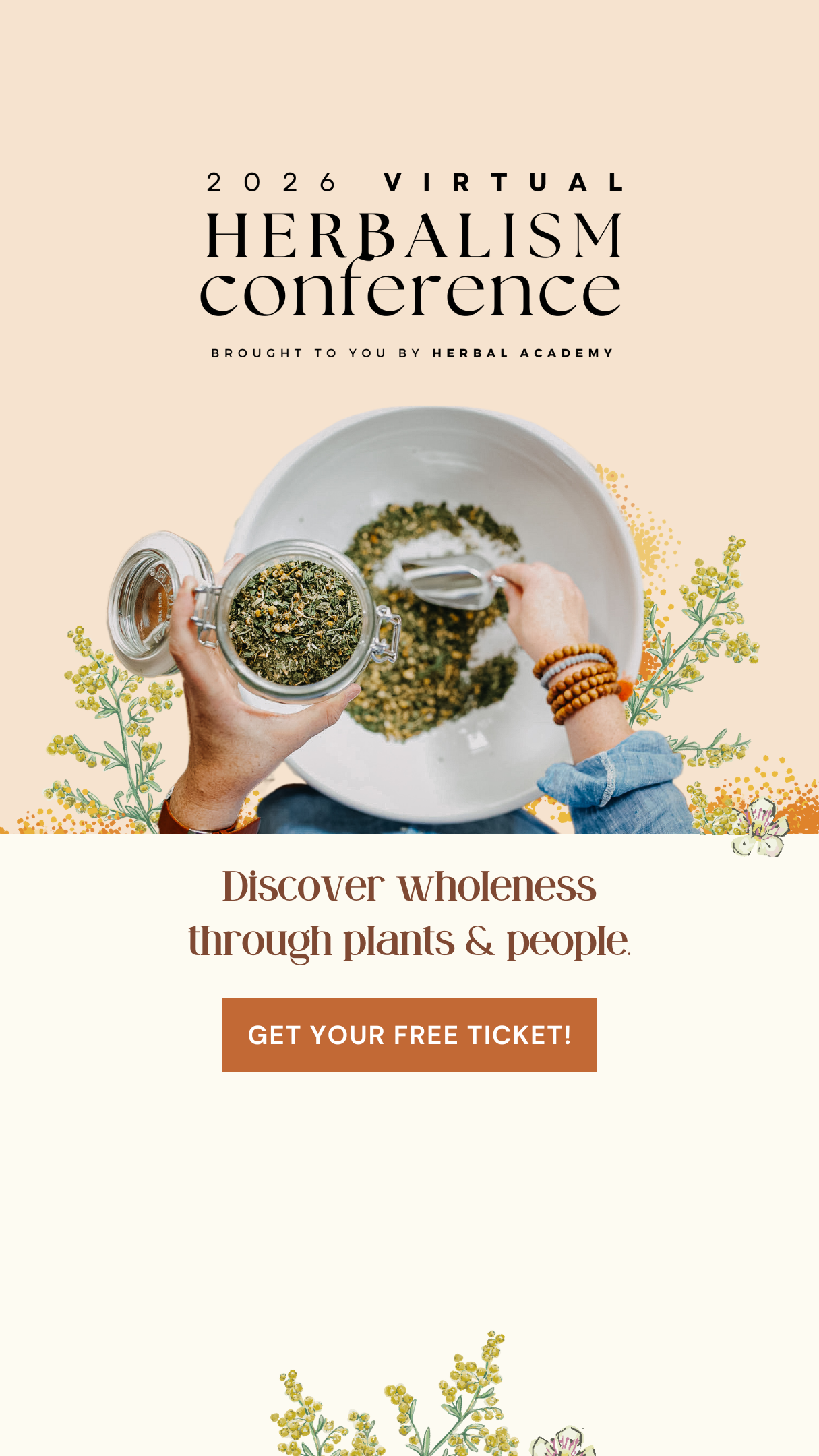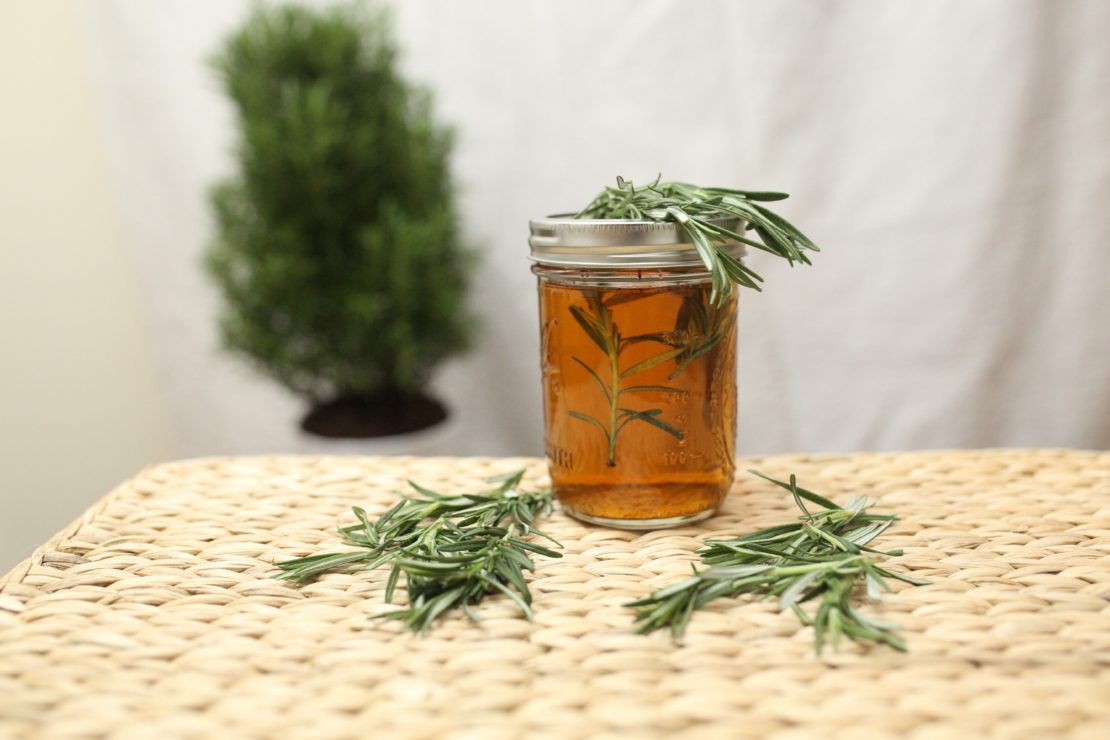
DIY Rosemary Memory Elixir
“You have to begin to lose your memory, if only in bits and pieces, to realize that memory is what makes our lives. Life without memory is no life at all, just as an intelligence without the possibility of expression is not really an intelligence. Our memory is our coherence, our reason, our feeling, even our action. Without it, we are nothing.” – Luis Buñuel
Memory. It’s one of those things you don’t give much thought to as a child, but as you get older, you begin to think on it more and more—what it is, how to increase it, and how to hold on to it.
Today, I’d like to take a brief look at memory and what can be done to keep it active and healthy. I also want to share a recipe for a DIY rosemary memory elixir that you can use on a regular basis to support your body and promote memory health.
Memory: The Key To Who We Are
Memory is the process of encoding, storing, retaining, and recalling information and experiences. It is what makes us “us.” It is what allows us to function in the world.
Memories begin as information we take in with our five senses, and these memories are referred to as “perception memories” or “sensory memories.” This information is then transferred via synapses to an area of the brain that stores short term memories.
Short term memory is just that. It’s short, and it’s thought that the average human can only store around 7 short term memories for 20-30 seconds at a time before they’re gone or transferred to long term memory!
Short term memories that are important to us are moved via synapses in the brain to an area that stores long term memories. Here, these memories can be stored indefinitely.
In order for a short-term memory to move to a long-term memory, the information must be repeated over and over again (like studying for a test), it must be associated with a piece of information you already know (like remembering a person’s name by associating it with something familiar), or it must be something you’re interested in and motivated to remember (like learning how to eat healthy in order to lose excess weight).
In order to retain and recall these long term memories, attention is key. When you focus on the task at hand, your brain tends to process and store information correctly which helps when it comes time to recall that information later. Distractions can inhibit correct storage and recall so it’s important to slow down and focus when you’re doing something you want to remember. No multi-tasking! (Mohs, 2007)
The process of recalling our memories is necessary in order for us to know who we are, what we believe, and how to navigate ourselves in our society. Memory is important!
How To Keep Your Memory Healthy
Now, in order to keep our memory healthy, the first thing we need to do is to slow down and focus while we’re making the memory in the first place. This give us the best chance of encoding and storing the memory correctly so we can recall it later.
The next thing we need to do to keep our memory healthy is to keep our body healthy. This can be accomplished through a healthy diet and lifestyle, specifically when it comes to decreasing stress, eating a healthy diet with the correct amounts of healthy fats and antioxidants, and taking plenty of deep breaths of clean, fresh air.
Another thing to do in order to keep our memory healthy is to stimulate it regularly. Just like a muscle will atrophy when it’s not used enough, the synapses in the brain will slow down when they aren’t stimulated regularly. In order to stimulate the brain and strengthen these synapses we need to do things like reading new books, listening to new music, engaging in good conversation, playing games that require critical thinking, and even learning new, challenging skills (Bergland, 2014).
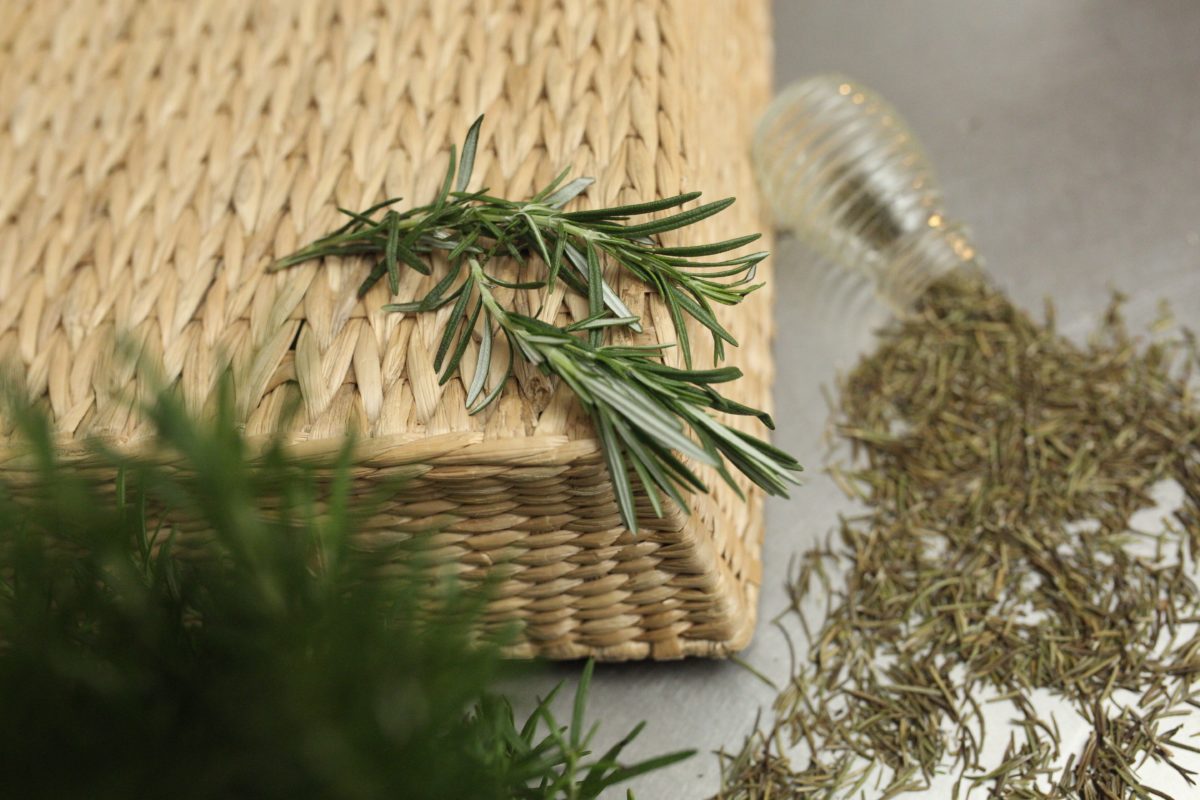
Herbal Support For Memory Health
When it comes to having a healthy memory, herbs can be a helpful support to the body.
The physical workings that make our memory what it is are complex, but when it comes to physical health beyond diet and lifestyle, supporting memory health with herbs basically boils down to keeping the cardiovascular, nervous, and endocrine systems healthy and strong as these are the systems that affect memory.
Herbs can be used to effectively support these systems on a regular basis and therefore support memory health.
Below, you’ll find a recipe for a rosemary memory elixir that can be used regularly to support a healthy body and memory. Before I share the recipe, though, I’d like to talk about the specific herbs and how they are useful.
Rosemary
Rosemary is the main herb in this rosemary memory elixir although it’s supported by many other great herbs.
David Hoffmann in his book, Medical Herbalism, lists rosemary as a stimulating, astringent herb that specifically acts on the cardiovascular and nervous systems (Hoffmann, 2003). Rosemary not only increases blood flow and tones the vascular system, but it stimulates the nervous system and has been shown in various studies to positively affect memory (Rosemary Monograph, n.d.).
Ginkgo
Ginkgo is another well-known herb for memory. Its actions center around the cardiovascular system, improving circulation, and strengthening arterial walls, especially in the cerebral region (Gladstar, 2008). The terpenoids in Ginkgo are thought to be what is responsible for improving circulation in the brain and body as well as exerting a protective action on the nerves (Ginkgo Monograph, n.d.).
And according to a materia medica from Bastyr University, Ginkgo has been shown to enhance the memory and cognitive function in part by improving the synthesis and turnover of neurotransmitters and normalizing ACh receptors in the hippocampus (Bastyr, n.d.).
Gotu Kola
Gotu kola, like many of the herbs in this rosemary memory elixir, has an affinity for the cardiovascular and nervous systems offering anti-inflammatory, cardioprotective, relaxant, and adaptogenic actions among others.
Gotu kola specifically works to increase vascular tone and increase circulation specifically to the brain. It’s often used in cases of mental fatigue and stress, and it has anti-anxiety effects due to its modulation of gamma-aminobutyric acid (GABA), an inhibitory neurotransmitter that induces feelings of relaxation and calm (Gotu Kola Monograph, n.d.).
Oats
Milky oats or oatstraw is another herb used in this rosemary memory elixir and is mostly used for its supportive, tonic qualities.
Oats are relaxing nervines that soothe and strengthen the entire nervous system and are especially helpful in times of stress (Hoffmann, 2003). Herbalist Rosemary Gladstar says their mucilaginous properties are even helpful for damage to the myelin sheath of nerve fibers (Gladstar, 2008).
Oats affect the cardiovascular system by toning blood vessels, therefore, improving overall blood flow to all parts of the body. They also nourish and moisturize the endocrine system. This, along with their cardiovascular and nervine actions, make them a great herb to use for the brain and memory. Speaking of memory, some studies have been done that show a positive link between the regular use of oats and a short term increase in concentration and mental clarity in adults and the elderly (Oatstraw Monograph, n.d.).
Peppermint
Peppermint is mainly used in this rosemary memory elixir to give it a good flavor as it pairs nicely with the other herbs, especially rosemary, but peppermint also has some benefits of its own to offer.
Not only is it high in vitamins and minerals, but it is a circulatory stimulant and has both relaxing and stimulating effects on the nervous system depending on what the body needs at the moment (Peppermint Monograph, n.d.). As you can see, peppermint tops this elixir off perfectly!
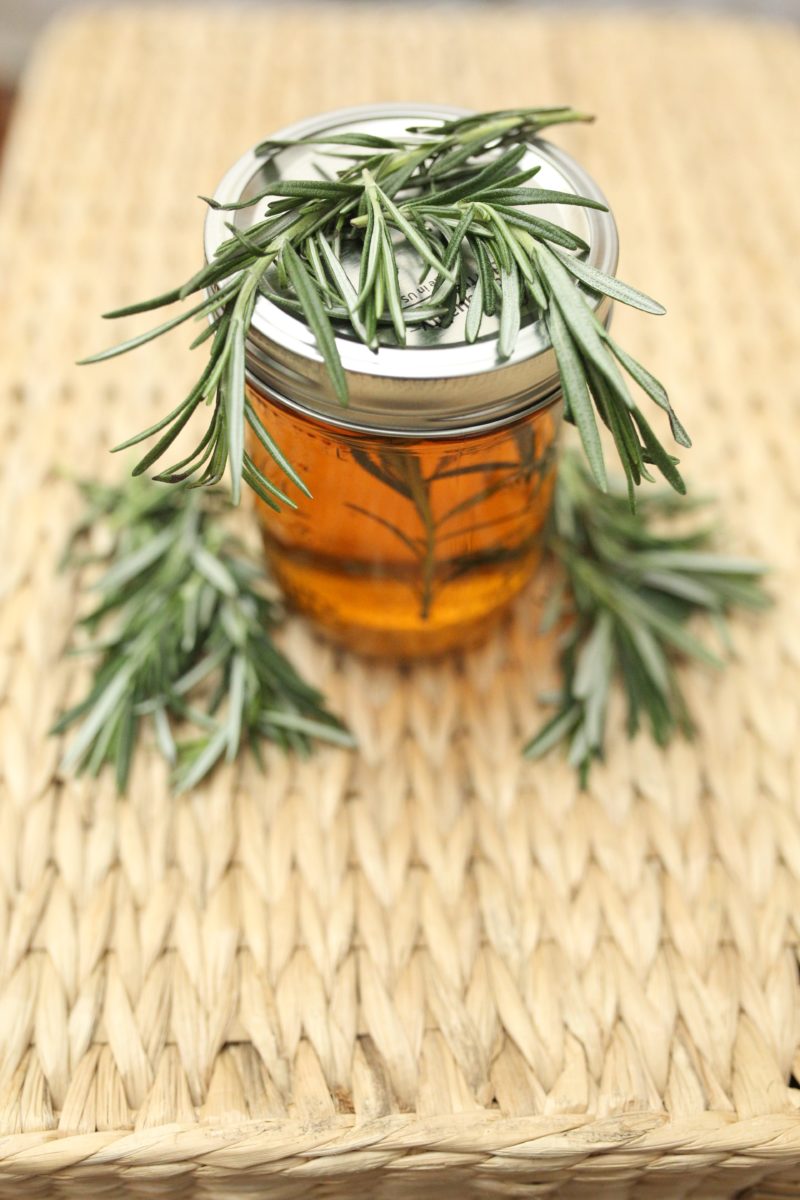
DIY Rosemary Memory Elixir
The following recipe is for a rosemary memory elixir. This elixir can be used daily to support memory health. It’s made using dried herbs in order to store the mix long term, but you can certainly make it with fresh herbs if you wish!
PRECAUTIONS: If you have heart disease or are on cardiac medications, please consult with your doctor before using this elixir. If you are pregnant, please consult with your obstetrician or midwife before using.
Rosemary Memory Elixir
- Combine dried herbs and mix well. Label and store the mixture in a cool, dark place until you’re ready to make your elixir.
- When you’re ready to make your rosemary memory elixir, take a glass pint jar and fill it half full of your herb mix (fill it full if using fresh herbs).
- Fill the jar half full with brandy, and then fill the remaining half of the jar with honey. Use a spoon to mix the herbs, brandy, and honey well.
- Cover with a lid, label your jar, and place it in a cool, dark place for 6 weeks. Stir the mixture a few times a week, if you can remember.
- After 6 weeks, strain the herbs from your elixir, and compost them. Then bottle and label your rosemary memory elixir, and store it.
Usage:
Adults take 30 drops of elixir daily.
For more recipes along this line, download our FREE 11 Herbal Recipes for Memory and Focus ebook!
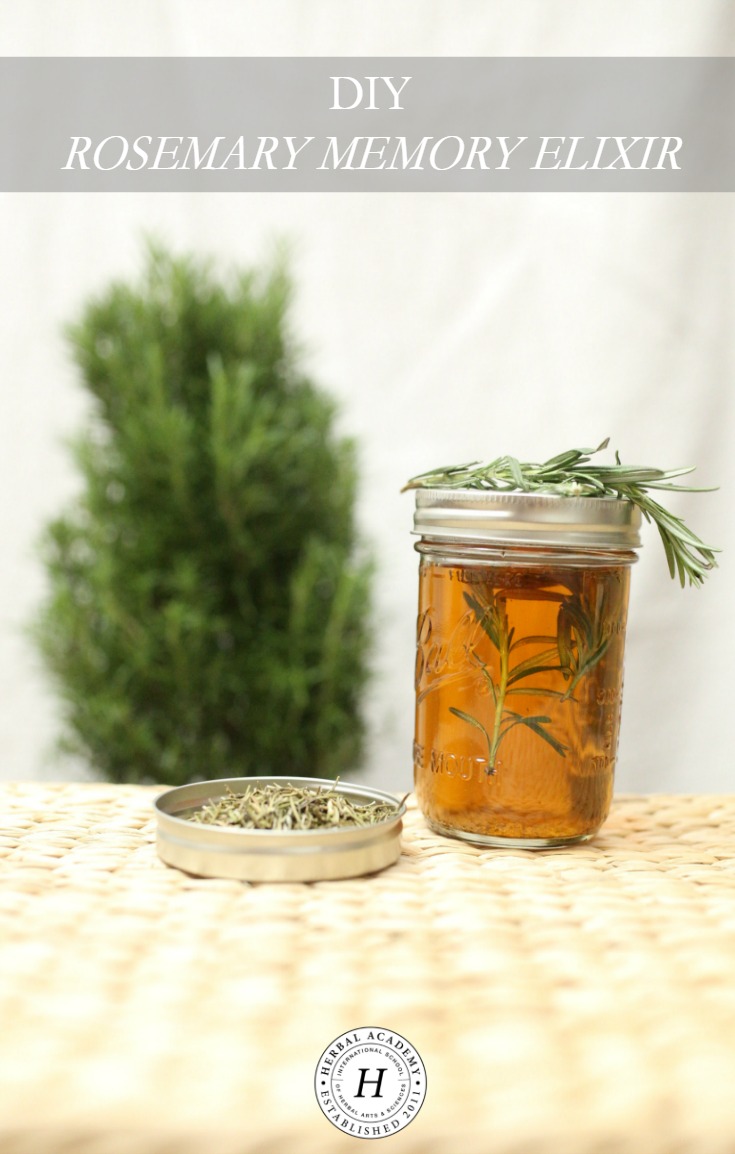
REFERENCES
Bastyr University. (2003). Materia medica (unpublished document).
Bergland, C. (2014, March 12). Eight Habits that Improve Cognitive Function. Retrieved April 27, 2017, from https://www.psychologytoday.com/blog/the-athletes-way/201403/eight-habits-improve-cognitive-function
Ginkgo Monograph. (n.d.). Retrieved on 4/20/2017 from http://herbarium.theherbalacademy.com/monographs/#/monograph/3058
Gladstar, R. (2008). Rosemary Gladstar’s herbal recipes for vibrant health: 175 teas, tonics, oils, salves, tinctures, and other natural remedies for the entire family. North Adams, MA: Storey Pub.
Gotu Kola Monograph. (n.d.). Retrieved on 4/20/2017 from http://herbarium.theherbalacademy.com/monographs/#/monograph/3054
Hoffmann, D. (2003). Medical herbalism. Rochester, VT: Healing Arts Press.
Mohs, R. (2007, May 08). How Human Memory Works. Retrieved April 20, 2017, from http://science.howstuffworks.com/life/inside-the-mind/human-brain/human-memory.htm
Oatstraw Monograph. (n.d.). Retrieved on 4/20/2017 from http://herbarium.theherbalacademy.com/monographs/#/monograph/2032
Peppermint Monograph. (n.d.). Retrieved on 4/20/2017 from http://herbarium.theherbalacademy.com/monographs/#/monograph/1016
Rosemary Monograph. (n.d.). Retrieved on 4/20/2017 from http://herbarium.theherbalacademy.com/monographs/#/monograph/3044


